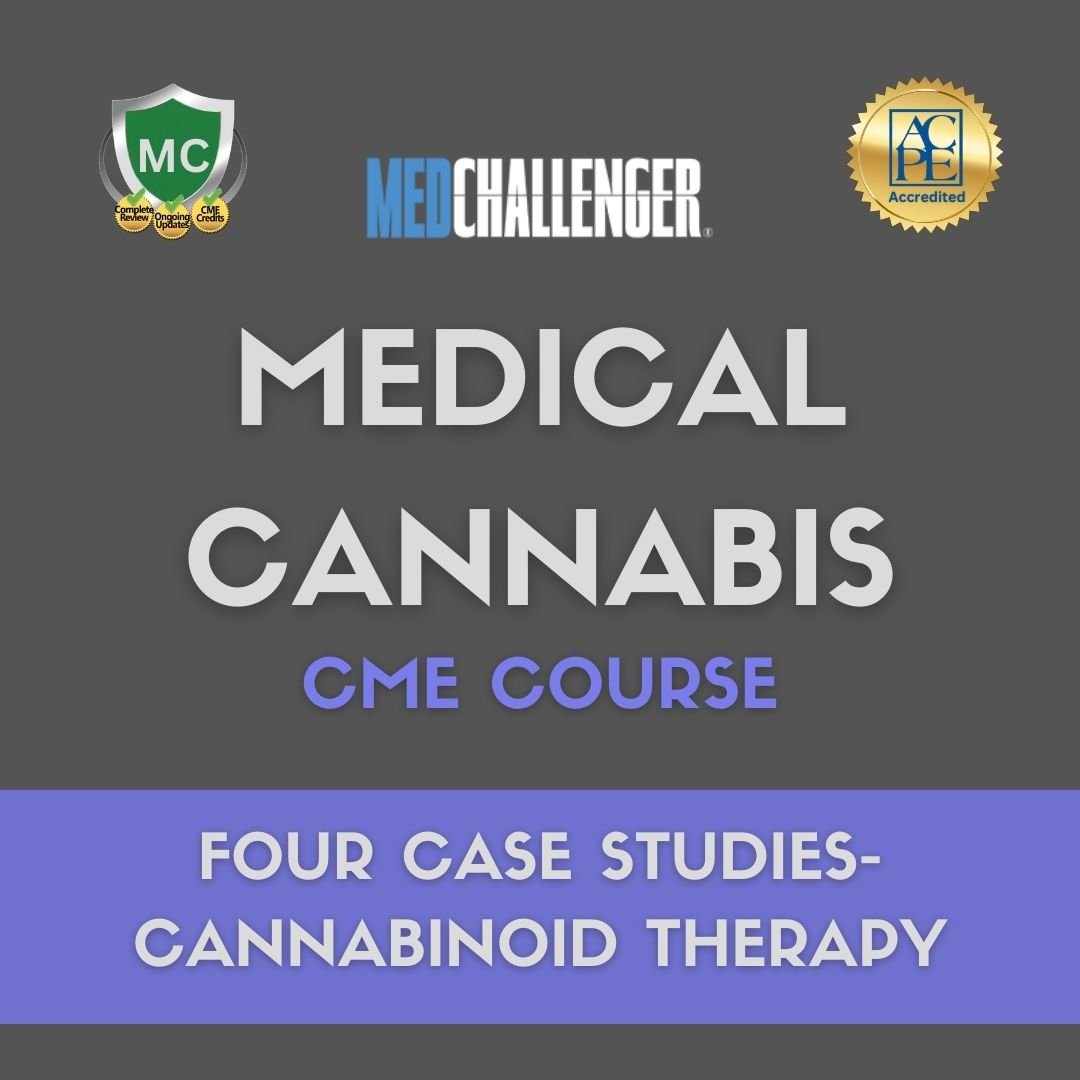Medical Cannabis CME Course, Volume 1 - $199
Includes 4 Modules:
The Endocannabinoid System
FDA Approved Cannabinoid Medications
Cannabinoids for Chronic Pain and Decreasing Opioid Use
Pharmacogenetics and Cannabinoid Medications
A free trial is also available for review at our CME Partner site.
Designed to demystify a controversial subject with scientifically-backed answers, this ACPE accredited medical cannabis CME course will give you the information you need to answer your patients’ questions about medical cannabis, how cannabinoid medications might become a valuable tool in your pharmacological catalog, and how to develop your own methodology of implementing cannabinoids into your medical practice.
Course Highlights:
Online cannabis medical education course, covering every aspect of cannabis from a medical perspective, up-to-date questions and answers, images, graphics, and diagrams.
Written by practicing physician Kevin Smith, MD, MPH
Video-based medical cannabis CME modules with post-video Q&A review
Modules 1-4 available as a volume set ($199.)
45 questions for review and retention
Adaptive self-assessment with guided remediation
Earn 3.25 ACPE credits
Concise video segments about medical cannabis science and approved medical applications.
Science-based cannabis medical education course modules.
Author: Kevin Smith, MD, MPH, FACOEM
Available modules of the medical cannabis CME course.
This course is module-based, providing video segments along with self-assessment question
and answer review on the following subjects. Modules are available as a volume set.
The Endocannabinoid System
After completing this topic, you will be able to:
Discuss the recent history of THC pharmacology.
List various clinical effects of the ECS.
Identify limitations of available research on the ECS.
Recognize that the ECS is dependent on lipid-based pharmacokinetics and pharmacodynamics.
List the components of the ECS.
Identify the specific enzymes used by the ECS.
List the ligands of the ECS receptors.
Explain the dynamics of ECS receptor expression.
State the locations, expression, and functions of CB1 receptors.
List specific Immune System functions of the ECS.
List specific physiologic functions related to the ECS.
List the ligands of the CB1 and CB2 receptors
FDA-approved Cannabinoid Medications
After completing this topic, you will be able to:
List the four currently approved FDA Cannabinoid drugs.
List the clinical conditions for which the first synthetic THC medications were originally FDA approved.
List the clinical conditions for which the FDA approved the plant extract isolate of CBD.
Describe the long history of pharmaceutical use of cannabis.
Explain the findings of the 2017 report from The National Academies of Sciences on clinical use of cannabinoids.
Describe pharmacokinetics of nabilone and THC analogues.
List conditions that dronabinol have been used for that are not FDA approved.
List common side effects of dronabinol.
Identify the FDA drug category of the THC analogue dronabinol.
Identify how nabiximols [Sativex®] is administered
Cannabinoids, Chronic Pain and Opioids
After completing this topic, you will be able to:
Compare efficacy of non-opioid and opioid drugs for chronic back pain.
Describe the magnitude of prescription opioid epidemic.
Explain how concomitant use of opioids and benzodiazepines impacts adverse effects.
State through what mechanisms cannabinoids impact on the nociception and spasticity.
List the receptor involved with cannabinoid effects on pain modulation.
Identify the general safety and adverse effects between opioids, NSAIDs, and Cannabinoids.
List the most common condition in which medical cannabis recommended.
List which negative side effect opioid sparing helps reduce.
List the primary objective of adding cannabinoid medication to chronic opioid therapy.
Identify which form of cannabis a patient will use when tapering from a slow release opioid.
Pharmacogenetics and Cannabis
After completing this topic, you will be able to:
Identify patient access issues and that pharmacogenetics is no longer as expensive.
Describe variation of alleles.
Identify the principle organ responsible for metabolizing medications.
Recognize the importance of how THC is metabolized.
Identify how cannabinoids act as drug metabolizing enzymes.
List CYP enzymes involved with CM metabolism.
List CYP enzymes and the liver.
Interpret genotype information for patient care.
Describe clinical application of cannabis with opioids.
State which clinical conditions support the need for Ppx testing.
Explain the risk for cannabis dependency.
Describe the natural history of psychosis-induced by THC use.
Medical cannabis CME course with online review questions and answers.
Our course question banks are intelligent, automatically targeting weaker areas of knowledge, saving your time.
Coming Soon - Volume 2
Medical Cannabis CME Course, Volume 2 - COMING SOON
Will Include 4 Modules:
Cannabinoid Therapy and Psychiatric Conditions
Cannabinoid Therapy for Neurodegenerative Diseases
History and Legality of Cannabis and CBD
Pharmacology and Dosing Cannabinoids
Coming Soon - Volume 3
Medical Cannabis CME Course, Volume 3 - COMING SOON
Will Include 5 Modules:
Therapeutic Uses of Minor Cannabinoids and Terpenes
Cannabinoids for Treatment of Autoimmune and Dermatological Conditions
Four Case Studies - Cannabinoid Therapy
Cannabinoids for Uterine Fibroids
Cannabidiol (CBD): Basic Science and Clinical Application


















